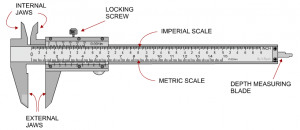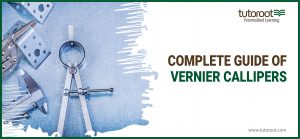Complete Guide to Vernier Caliper [updated]
As we all know by now, vernier caliper are most instrumental in taking measurements of linear dimensions. In order to take these measurements for the linear dimensions, while performing various important experiments in the Physics Laboratory, the vernier caliper equipment is unmatched in its efficacy. But the use of vernier calipers in the most accurate manner is most important so as not to get confused and wrongly apply them, ending up in recording wrong numbers. Vernier caliper not only used for linear measurements but also angular measurements.
Therefore, to help these students, we have put together a detailed description of the vernier caliper along with a Vernier Caliper Diagram and how they can be used for round objects. In addition to this, we will also talk about various applications of the vernier calipers in much more detail.
Vernier Caliper Diagram
Here is the pictorial description of vernier caliper diagram,

Vernier Caliper Construction
As shown in the vernier caliper diagram above, the vernier caliper is made up of two scales. The first is fixed, whereas the second is mobile. The fixed scale is referred to as the primary scale. It has a calibrated L-shaped frame with a fixed jaw. The Vernier scale is moveable. As shown in the vernier scale diagram the scale slips over the main scale and has a moveable jaw. Internal and exterior measurements are taken using these moveable and fixed jaws.
Parts of Vernier Caliper
As shown in the vernier caliper diagram above and as explained in the introduction, a vernier caliper is made up of two scales. The first scale is fixed, whereas the second one is mobile. The fixed scale in the vernier caliper is referred to as the primary scale. It has a calibrated L-shaped frame with a fixed jaw, whereas the Vernier scale is moveable. As shown in the vernier caliper diagram, the scale slips over the main scale and has a moveable jaw. The internal and exterior measurements are taken using these moveable and fixed jaws.
There are 25 divisions in a vernier scale, while the main scale has 24 divisions of same length. Thus, the divisions of the vernier scale are shorter than those of then main scale by 1/25. There are also vernier scales that are made up of 10 divisions, with the main scale having 9 divisions.
Errors of Vernier Caliper
There are different types of errors in Vernier Caliper, which we are going to discuss in detail below.
No Zero Error
As you can guess from the title itself, in this type of error, the two jaws of the vernier caliper are brought together. In this case, the main scale coincides with zero on the vernier scale.
Positive Zero Error
If the zero of the vernier caliper is ahead of the main scale, or if the zero of the vernier caliper is towards the right side of the main scale. This is known as a positive zero error.
Negative Zero Error
If the vernier scale is towards the left side of the main scale, for instance, the location of zero on the vernier scale is towards the backside, then it is referred to as a negative zero error
How to use a vernier caliper
Always calibrate the caliper before you start to use it, by closing the jaws and lining up the zero mark (0) on the scales. Now, place the object between the jaws and tighten them through sliding the moving scale. Do this until the jaws are against the object.
The recording of values on the main scale is done by moving the scale separately. You later add the values together and arrive at the final measurement.
So, the use of vernier caliper contains three stages:
First, you prepare the vernier caliper for action by locating the jaws in two sets.
Then, you read the scales that show inches or centimeters, beside divisions.
Now, ascertain the value of the smallest tick marks on the main scale.
Always remember to loosen the locking screw on the vernier caliper before you begin to use the scale.
Some tips to use vernier caliper
Always ensure the jaws are opened wide enough so that the object for measurement is properly fit inside for effective and accurate measurement
Always, read the line on the main scale that is aligning with 0 mark on the vernier scale
Now, check the first mark on the vernier scale that is lined up in alignment with the main scale
Now, it is easier to add the values
Vernier Caliper Uses
With its precision and ease in use, the Vernier Caliper is adopted by multiple industries, as you know it plays a very important and unparalleled role. The vernier caliper is also actively used for various purposes all the time.

- Machine Shops: While manufacturing various precise instruments and equipment, that are generally used in aviation and auto industries, the vernier caliper is actively used to reduce errors.
- Research: The Research Laboratories always need to have accurate measurements, in order to successfully complete or do their experiments. And for this process, the Vernier Caliper are very crucial.
- Educational Institutions: As you know already, the vernier caliper uses in educational institutions cover laboratories all the time, to help students perform various experiments, and understand the different uses of vernier caliper.
- Medical Instruments: Medical Equipment is made very carefully, following all the rules and regulations employed, as it plays an important role in saving people’s lives. So, for accurate measurements, while making medical instruments, vernier caliper are required.
- Locksmithing: Locking Mechanisms play a very important role in Locksmithing, and the interlocking process requires precise equipment and parts, which generally means the use of vernier caliper while making this equipment.
Brief About Parts of Vernier Caliper
The Vernier Calipers include various different parts which play an equal role in helping the individual get the best results without any errors. These parts are,
- Vernier Scale
- Main Scale
- Fixed Jaw
- Sliding Jaw
- Lock Screw
- Thumbscrew
- Depth Rod
Finding Least Count of Vernier Caliper
The least count of vernier caliper is also often referred to as vernier constant.
When you are using the Vernier Caliper, the vernier caliper least count is important, as it can be used to calculate various other important quantities and measurements. Now in order to find the vernier caliper least count, the smallest number got on the vernier scale reading is divided by the total number of vernier scale divisions.
In simple words, the least count of vernier caliper is the difference between one main scale division and a vernier scale division.
The Vernier Caliper Least Count Formula
The vernier least count is also known as the constant.
The formula is defined from the difference between 1 main scale and 1 vernier scale division.
VC = 1 MSD – 1 VSD
When there are n divisions on the vernier scale that correspond to (n-1) divisions on the main scale, the vernier caliper with the lowest count is:
LC = (1-n-1/n) MSD
Importance of the least count of vernier caliper
The least count of a vernier caliper is instrumental in getting most accurate reading, since it shows the shortest distance between two graduations on the scale
Conclusion
In the above article, we’ve covered everything about Vernier Calipers—from diagrams and parts to errors and applications. If you’re looking to deepen your understanding of such physics concepts or tackle other complex topics, Tutoroot’s one-on-one online tuition can be a game-changer. With personalized attention, expert teachers, and access to top resources, Tutoroot ensures that every student learns at their own pace and gains the confidence to excel in academics.
Tutoroot’s online tuition classes are designed to match each student’s learning style, helping them grasp even the most challenging concepts with ease. Real-time doubt-solving, structured lesson plans, and continuous performance tracking make Tutoroot a trusted learning partner for academic success. Unlock your potential with Tutoroot’s interactive learning experience today!
FAQ’s
What is the primary use of vernier caliper?
Vernier caliper are used for precise linear measurements
Describe the parts of a vernier caliper
The parts of the vernier caliper essentially consist of the main scale, vernier scale, fixed jaw, sliding jaw, lock screw, thumb screw, and depth rod.
What is the least count on the Vernier Caliper?
The Vernier Caliper Least Count is 0.1 mm

One thought on “Complete Guide to Vernier Caliper [updated]”